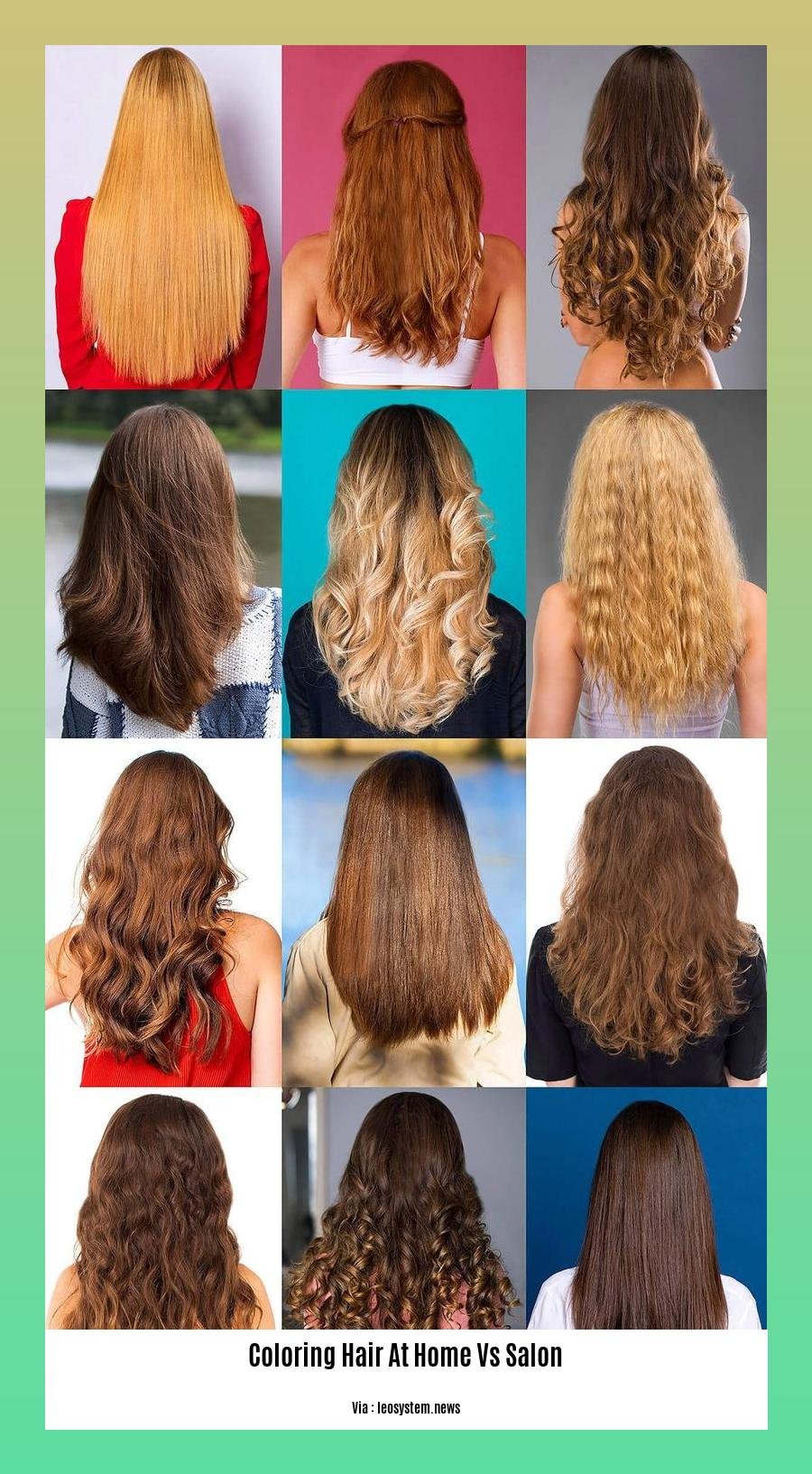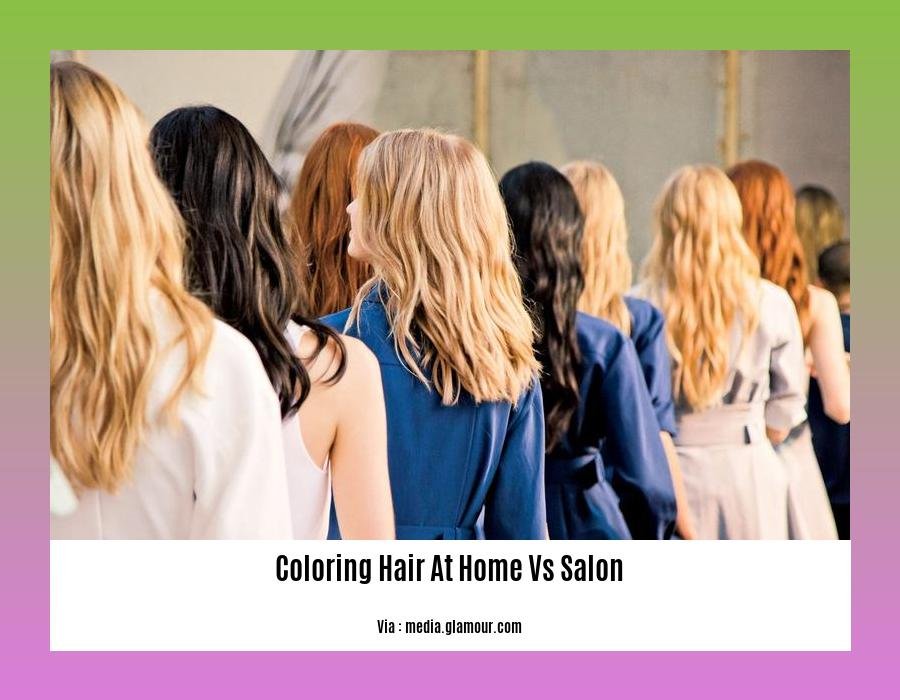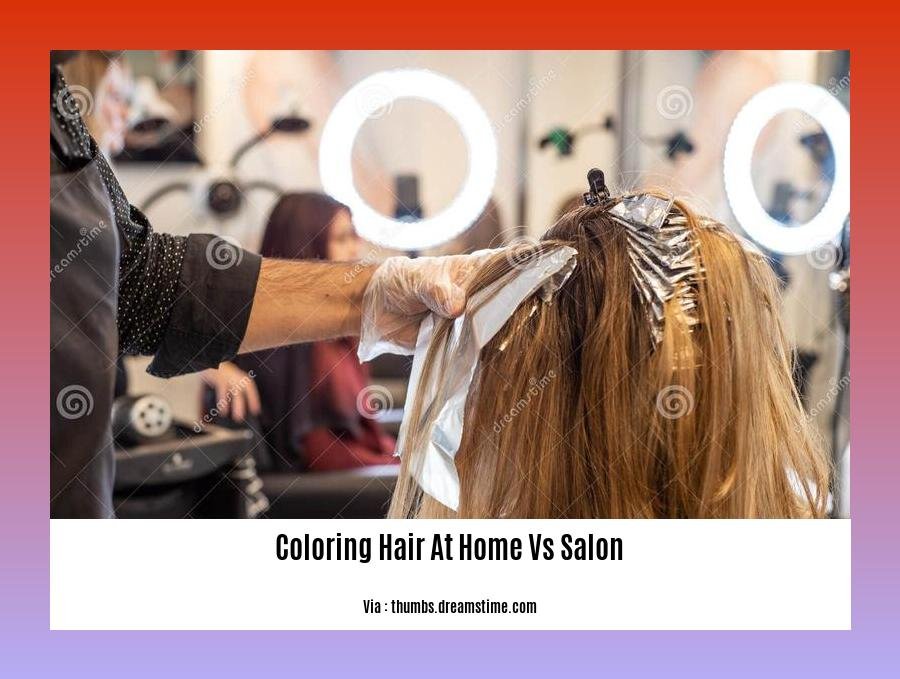Why Choose Between Coloring Your Hair at Home vs. in a Salon? In the world of hair coloring, the eternal debate between DIY and salon treatments rages on. On one hand, the allure of at-home convenience and affordability beckons, while on the other, the promise of professional expertise and lasting results entices. Embark on a journey to unravel the intricacies of both options, weighing the pros and cons to help you make an informed choice that best suits your hair care aspirations.
Key Takeaways:
-
Dyeing hair at home is cheaper but may not result in a perfect outcome.
-
Dyeing hair at a salon is more expensive but offers guaranteed better results.
-
The decision between home and salon coloring is personal and budget-dependent.
-
If you’re willing to risk a less-than-perfect outcome, home coloring is a good option.
-
If you desire guaranteed results, salon coloring by a professional is recommended.
Dyeing Your Hair at Home vs. Salon: Unraveling the Key Differences

We all seek a revitalized look, and hair coloring often tops the list of transformations. However, the age-old question lingers: should you embark on a DIY hair coloring adventure or entrust your tresses to professionals at a salon? Let’s delve into the pros, cons, and crucial factors to consider when making this decision.
Salon Splendor: A Guaranteed Professional Touch
Seeking guaranteed results with minimal risk? Opting for a salon experience might be your golden ticket. Skilled hairstylists possess the expertise to assess your hair’s condition, recommend suitable color options, and execute the coloring process flawlessly. Plus, they can provide valuable advice on maintaining your colored locks.
Home Dyeing: Embracing the DIY Spirit
If you’re a fearless DIY enthusiast, coloring your hair at home offers a budget-friendly alternative. With readily available hair color kits, you can transform your look without breaking the bank. However, be prepared for a bit of a learning curve, and remember, perfection may not always be achievable.
Comparative Glance: Pros and Cons
| Method | Pros | Cons |
|---|---|---|
| Salon Coloring | Guaranteed results, Professional expertise, Personalized advice | Higher cost, Limited color choices, Scheduling constraints |
| Home Dyeing | Cost-effective, Convenient, Wide color selection | Risk of uneven results, Potential hair damage, Limited professional guidance |
Factors to Ponder: Making an Informed Choice
- Skill Level and Comfort: Assess your comfort level with DIY projects. If you’re a novice, a salon visit might be wiser.
- Budget Considerations: Compare the costs of at-home kits and salon services to determine the most feasible option.
- Desired Results: Evaluate your expectations. If you seek a drastic transformation or have complex hair needs, a salon’s expertise might be invaluable.
- Time Constraints: Consider your schedule. Home dyeing offers convenience, while salon appointments require dedicated time slots.
Conclusion: A Personal Choice with Informed Insights
Ultimately, the decision between coloring hair at home vs salon is a personal one, influenced by a plethora of factors. Whether you prioritize budget-friendly convenience or seek professional guidance, equip yourself with the necessary knowledge to make an informed choice that aligns with your hair goals and preferences.
-
Wondering about the closest 24-hour emergency vet? Take a peek at our list of nearby vets that can provide immediate care for your pet. closest 24 hour emergency vet
-
Want to know more about CNA home care job descriptions? Find out about the qualifications, requirements, and responsibilities of CNAs employed in home care settings today. CNA home care job description
-
Seeking information about CNA job descriptions for home health? Explore our comprehensive guide that outlines the duties, skills, and certifications required for a successful career. CNA job description for home health
-
Curious about co-op classes for homeschoolers? Discover how co-op classes offer a stimulating learning environment, foster social development, and provide unique opportunities for homeschooled students. co-op classes for homeschoolers
DIY Hair Coloring Step-by-Step Guide

Think about coloring your hair but can’t decide if DIY or salon is the best way? This guide dives into the dos and don’ts to help you reach your desired locks!
Key Takeaways:
- DIY hair coloring can be a cost-effective way to achieve a new look.
- Home hair color kits offer a wide range of shades.
- Coloring your hair at home requires patience and attention to detail.
- It’s essential to follow the instructions provided with your hair color kit.
- If you’re unsure about DIY hair coloring, it’s best to consult a professional stylist.
Choosing Between DIY and Salon Hair Coloring:
DIY hair coloring offers a budget-friendly alternative to salon services. With a wide range of home hair color kits available, you have the flexibility to choose the perfect shade for your desired look. However, it’s important to remember that DIY hair coloring requires patience and attention to detail. If you’re unsure about your ability to achieve the results you want, it’s best to consult a professional stylist.
Steps for DIY Hair Coloring:
-
Preparation:
-
Gather your necessary tools, including a hair color kit, gloves, a mixing bowl, a brush, and petroleum jelly.
- Protect your clothes and the surrounding area with a towel or plastic sheet.
-
Apply petroleum jelly to your hairline and ears to prevent staining.
-
Mixing the Hair Color:
-
Follow the instructions provided with your hair color kit to mix the color and developer.
-
Use a mixing bowl and a brush to blend the color thoroughly until it reaches a smooth consistency.
-
Application:
-
Start by applying the hair color to your roots.
- Use a brush to section your hair and apply the color evenly.
-
Once you’ve covered your roots, work your way down the length of your hair, ensuring that all strands are saturated with color.
-
Processing:
-
Once you’ve applied the hair color, set a timer according to the instructions provided with your kit.
- During processing, keep the color away from your eyes and skin.
-
If you experience any irritation or discomfort, rinse the color out immediately.
-
Rinsing and Conditioning:
-
Once the processing time has elapsed, rinse your hair thoroughly with warm water until the water runs clear.
-
Apply the conditioner provided with your hair color kit to help restore moisture and shine to your hair.
-
How to Dye Hair at Home in 7 Easy Steps – L’Oréal Paris
- How to Dye Your Hair at Home Without Screwing It Up | Allure
Tips for getting the best results when coloring hair at home
There are a million choices to choose from when it comes to dyeing your hair. One of the common questions every girl asks is whether to color her hair at home or in a salon. This article will give you pointers to how you can color your hair at home and will suggest what you can do to achieve salon-like results.
Key Takeaways:
- Ensure you pick the correct shade of color based on your natural hair color.
- Don’t wash before dyeing. Your hair’s natural oils will act as a barrier against scalp irritation.
- To avoid stains, make sure you put on gloves and a protective cape.
- Carefully follow all the instructions provided on the hair dye box.
- Apply a hair mask after dyeing to restore hair moisture and color.
- Use color-safe shampoo and conditioner on a regular basis to maintain hair color.
How to Dye Hair At Home?
- Brush and Section:
- Brush your dry hair first to eliminate tangles.
- Split the hair into small sections for easy coloring.
-
Make a middle part that extends to the back of your head.
-
Color the Hairline:
- From the front section of hair, take a clip off.
-
Apply hair color directly to your hairline, blending thoroughly using gloved fingers.
-
Work on the Part:
- Leave front sections free. Then create quarter-inch thick sections along the part.
-
Start dyeing the roots and spread dye with either a brush or fingers.
-
Color Length:
- Skip this step if you are just touching up your roots.
-
Apply dye to the length of the hair for all-over color.
-
Saturate the Back:
- Unclip a back section and color along the remaining half of the part.
- Apply dye liberally to ensure total coverage.
Sources:
-
How to Dye Hair at Home in 7 Easy Steps – L’Oréal Paris
-
How to Dye Your Hair at Home Without Screwing It Up | Allure
Caring for Colored Hair
So, you want to change your hair color. Great! But should you do it yourself or go to a salon?
Here’s my 2 cents:
- Home Dyeing:
- If you’re on a budget and comfortable with DIY projects, at-home kits are readily available. Experiment, and learn as you go, accepting that perfection might elude you initially.
- Pros:
- Cost-effective.
- Convenient.
- Wide color selection.
-
Cons:
- Uneven results.
- Potential hair damage.
- Limited professional guidance.
-
Salon Dyeing:
- The salon experience offers guaranteed results, expert advice, and smooth execution.
- Pros:
- Professional results.
- Wide color range.
- Hair health assessment.
- Cons:
- Higher cost.
- Time-consuming.
- Scheduling constraints.
Ultimately, the choice is yours. Consider your budget, skill level, desired results, and time constraints. Regardless of your decision, read instructions carefully, protect your skin and clothes, and care for your colored hair with color-safe products.
Key Takeaways:
- Home dyeing:
-
Affordable and convenient with a wide color selection but requires skill and carries the risk of uneven results and hair damage.
-
Salon dyeing:
-
Provides professional results, expert advice, and hair health assessment, but it’s more expensive and time-consuming.
-
Pre-dye hair care:
-
Hair should be unwashed to allow natural oils to protect the scalp.
-
Post-dye hair care:
-
Use color-safe shampoo and conditioner to maintain vibrancy and prevent color fading.
-
Regular maintenance:
-
Touch-ups and regular trims are essential to keep colored hair looking its best.
-
Avoid heat styling:
- Use heat protectant products and minimize heat styling to prevent color fading and damage.
Relevant URL Sources:
- At-Home Hair Dyeing: Pros, Cons, and Tips
- How to Care for Colored Hair: A Step-by-Step Guide
FAQ
Q1: Can I achieve the same quality of results when coloring my hair at home as in a salon?
A1: The outcome of home hair coloring may vary compared to professional salon services. While at-home dyes provide convenience and affordability, they may not offer the same level of precision and expertise found in salons. Salons have trained stylists who can assess your hair’s condition and recommend suitable products to ensure the best results.
Q2: What are the potential risks of coloring my hair at home?
A2: Incorrect application or the use of harsh chemicals in at-home hair dyes can potentially damage your hair. Additionally, some individuals may experience allergic reactions to certain dye ingredients. It’s important to carefully follow the instructions on the dye box and conduct a patch test before applying the dye to your entire hair.
Q3: What are the advantages of coloring my hair in a salon?
A3: Salon hair coloring offers several advantages compared to at-home dyeing. Salons have trained stylists who can assess your hair’s condition and recommend suitable products to ensure the best results. They also have access to a wider range of professional-grade hair dyes and techniques, allowing for more customization and tailored color outcomes.
Q4: How can I save money on hair coloring services?
A4: To save money on hair coloring, consider DIY dyeing with care, using professional touch-ups for initial color changes and maintaining the color with at-home touch-ups. Additionally, look out for salon discounts and promotions, which may offer cost-effective options for professional hair coloring services.
Q5: Are there any specific hair care tips I should follow after coloring my hair at home or in a salon?
A5: After coloring your hair, it’s essential to use color-safe shampoo and conditioner to maintain the vibrancy of your colored hair. Additionally, avoid using harsh styling products or heat tools, as these can further damage or fade the color. Regular trims can also help to remove split ends and keep your hair looking healthy and vibrant.
- Does 100% Polyester Shrink? A Complete Guide to Washing & Drying - April 16, 2025
- Elegant Drapery Solutions for Arched Windows: A Complete Guide - April 16, 2025
- The Best Dining Room Tables with Drop Leaves: A Buyer’s Guide - April 16, 2025










